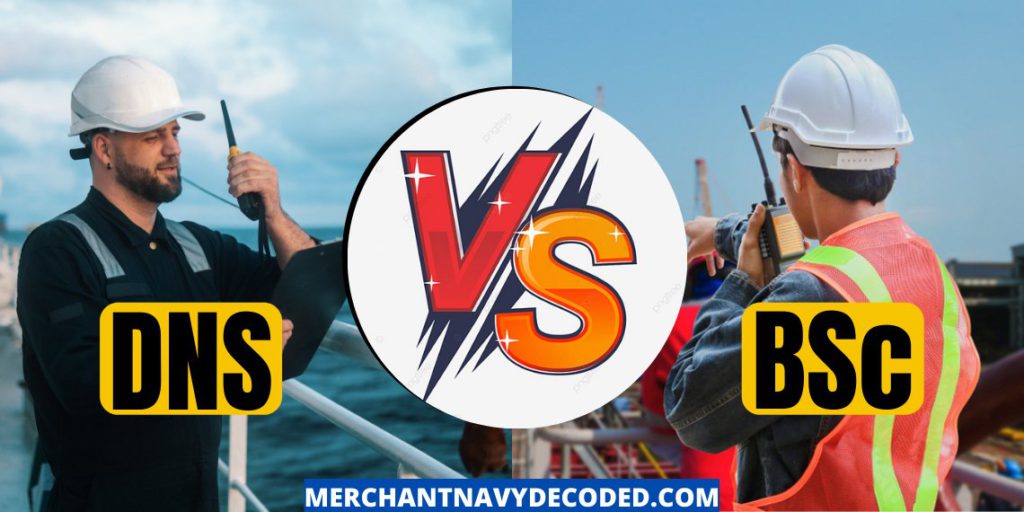DNS – Is it Worth Doing? | DNS Vs BSc – Which is better
Merchant Navy is a popular career choice in India, and one of the most common questions that aspiring sailors ask is whether they should join the Deck side or the Engine side. The decision ultimately depends on your interests and passion, not just external factors like rank and status.
Importance of Pursuing Your Passions

As someone who joined the Engine side by mistake, I can attest to the importance of having a genuine interest in the field you choose. During my counselling sessions, I saw all the smart kids joining the Marine Engineering and Research Institute (MERI) in Kolkata, and I followed suit without any real passion or hobby for becoming an engineer. Even today, I don’t get excited by machines like some of my colleagues do.
This is a common problem in India, where students often pursue careers based on parental expectations or societal pressure rather than their own interests and aspirations. However, I’ve learned over time that pursuing your passions and interests is the key to success in any career. Whether you’re educated or not, if you have a genuine interest and passion for something, you can excel in it.
Joining the Deck Side

Some people are drawn to the Deck side because of the status and symbol associated with it. They may be influenced by the rank of the Captain, or simply be attracted to the epaulettes. If you’re someone who enjoys leadership roles and wants to take on responsibility, the Deck side might be more suited to your interests.
There are two main options for joining the Deck side: a one-year course called Diploma in Nautical Science (DNS) or a three-year course called BSc in Nautical Science. While many people assume that a Diploma is inferior to a degree, it’s important to note that every profession is different. The DNS course was introduced when the demand for officers was high and colleges started offering it to meet the demand. However, the oversupply of officers in recent years has made finding jobs difficult, leading to instances of depression and suicide among sailors.
To address this issue, the government has made sponsorship mandatory for DNS courses. This means that students are offered a job before joining the college, with the company providing an offer letter that allows the student to pay the fees and complete the course. Once the course is completed, the student will start working for the sponsoring company. This is different from traditional college courses, where students pay the fees and then look for a job afterwards.
DNS V/S BSc

Degree V/s Diploma
In DNS, a Diploma in Nautical Science course, a BSC degree is awarded upon passing the Second Mates exams, making it a unique pathway to obtaining a degree. It should be noted that BSC is a degree course, while DNS is a diploma course, making the DNS route an unconventional means of achieving a degree in nautical science.
Another key difference is the duration of the course. DNS is a diploma course that typically lasts for one year, while BSc is a degree course that takes three years to complete. However, it is worth noting that DNS becomes a degree course once a student completes their cadetship, which is 18 months of sailing experience. This means that DNS students can pursue higher education opportunities and even apply for the Indian Administrative Service (IAS) if they so desire.
Job Security
In BSc, students must first pay their fees and then wait for their placement in a shipping company. However, with DNS, students receive sponsorship from a shipping company before they begin the course. This means that students have a job waiting for them after completing the course, offering a sense of job security that BSc may not provide.
Example: Rohit and Akash

Faster Promotions
Let’s take the example of Rohit and Akash to understand this difference better. Both Rohit and Akash passed their 12th exams at the age of 17. Rohit received sponsorship from Synergy Shipping and chose to pursue DNS while Akash enrolled in BSc in Nautical Science at Tolani Maritime Institute and got placed in Synergy in his 2nd year of BSc.
At the age of 18, Rohit completed his DNS and began his cadetship. Six months later, he joined a ship and completed his cadetship at the age of 20.5. He was then eligible to take the 2nd mate exam to become a third officer.
Meanwhile, Akash completed his BSc in Nautical Science at the age of 20 and started his cadetship six months later. He completed his cadetship at the age of 22 and was also eligible for the 2nd mate exam.
As we can see, there is a difference of 1.5 years in their ages when they became eligible for the 2nd mate exam. This difference can be even greater if they had joined different companies with varying waiting periods for cadetship completion.
Earnings – DNS and BSC

Apart from job security, DNS also offers financial security. Since DNS students begin their careers earlier, they start earning money sooner. For instance, if a DNS cadet earns Rs. 30,000 per month, they can earn up to Rs. 5,40,000 in 18 months. This can help them pay off their course fees and loans early on. In contrast, BSc students must wait for their placement in a shipping company before they can begin earning. This can take a considerable amount of time, which may not be ideal for those who are looking to start their careers early.
Fees Structure

DNS offers the advantage of relatively lower course fees compared to BSc Nautical Science.. The average fees for DNS range from 5 to 8 lakhs, while BSc Nautical Science fees range from 7 to 15 lakhs. Tolani Maritime Institute has the highest fees at around 18 lakhs, while TS Chanakya has the lowest at 7 lakhs.
Type of Companies

Some of the best shipping companies that recruit DNS cadets include Torm, Anglo, Scorpio, and Synergy but sometimes there are some poor shipping companies where the waiting period will suddenly increase to 18 months because every 12 months the company is taking so many cadets. so you have to be very sensible when making your decision. While on the other side when it comes to BSC Nautical Science since there is no job security join only those colleges which have 100 % placement like Tolani Maritime Institute, AMET with Maersk Sponsorship, IMI with MSC Sponsorship and TS Chanakya and very good shipping companies like Shell, Chevron, Teekay, MOL, and NYK which the best shipping companies prefer BSC cadets, not the DNS students. The best part of BSC Nautical Science is you mature over the period of 3 years. When you join the ship at the age of 20 your maturity level is different, your way of handling the stress is different and your chances of quitting are less.
Conclusion

Both DNS and BSc Nautical Science courses have their pros and cons. It matters to you what you choose. In case you are a person from a low middle-class family with a humble background then DNS is always preferred over BSc because the investment is less and you get job security as well. Yes, you get education loans for both of them but in DNS you can repay it easily as well. If you think you are not mature enough to handle the pressure right now or it will difficult for you then go for BSC Nautical Science. If you have always been in a very protective environment and still you want to join the Merchant navy then go for BSC because these 3 years will train you better. Whatever the choice, it is essential to consider all factors and make an informed decision that aligns with one’s career goals.
If you want to know about IMUCET and how to join the Merchant navy, you can contact.
JMDi Academy
| Contact no: | +919051206790, +917417085906 |
| jmdidehradun@gmail.com | |
| Website | https://jmdiacademy.com/ |
| https://www.instagram.com/jmdiacademy/ | |
| JMDi Academy’s Result | https://jmdiacademy.com/2022-result/ |
Join our IMUCET Decoded Telegram Group for regular updates regarding IMUCET – Click here to Join
Disclaimer :- The opinions expressed in this article belong solely to the author and may not necessarily reflect those of Merchant Navy Decoded. We cannot guarantee the accuracy of the information provided and disclaim any responsibility for it. Data and visuals used are sourced from publicly available information and may not be authenticated by any regulatory body. Reviews and comments appearing on our blogs represent the opinions of individuals and do not necessarily reflect the views of Merchant Navy Decoded. We are not responsible for any loss or damage resulting from reliance on these reviews or comments.
Reproduction, copying, sharing, or use of the article or images in any form is strictly prohibited without prior permission from both the author and Merchant Navy Decoded.




In My way Experince of A Ship Cadet to Ship Captain . I choose DNS . I will prefer DNS for a miidle class family child . but you have to choose a better college and comapany . LIke Anglo, Synergy, Storm <Scorpio . I choose Anglo Easrtern